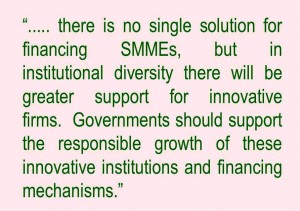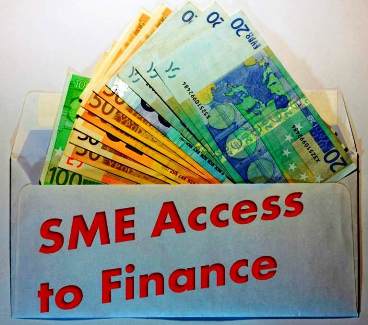The Financial Times recently published an article written by Matt Gamser and Paul Lee concerning access to finance for SMMEs. Gamser and Lee point out at the end of the article that there is no single solution for financing SMMEs, but in institutional diversity there will be greater support for innovative firms. Governments should support the responsible growth of these innovative institutions and financing mechanisms.
Micro enterprises act more like consumers mingling business with consumer finance. In many countries that segment is trading in cash, rather than using trade credit or credit cards. The larger SMEs may be better off if they can be made trade credit worthy, since trade credit is the largest source for working capital. Generally it can be said that trade credit extended to businesses is larger than that of bank credit. Once trade credit lines have been established, surely bank finance will follow. There is a preoccupation in many quarters, including the G20, that the biggest impediment to SMEs growth is lack access to bank finance. It would be prudent to work on trade credit first, which is interest free. Access to bank finance would follow. Alternative finance solutions are already widely used by the SME community, because banks have stopped lending to SMEs and as indicated in the article should be supported through appropriate regulations.
The summary of the article is outlined below:
 “A new wave of financing innovations is democratising access to capital, especially for those most vulnerable among small, medium and micro-enterprises (SMMEs). Are governments and large financial institutions ready to embrace these innovations and enable the necessary regulatory reforms to support the growth of entrepreneurs across Asia?
“A new wave of financing innovations is democratising access to capital, especially for those most vulnerable among small, medium and micro-enterprises (SMMEs). Are governments and large financial institutions ready to embrace these innovations and enable the necessary regulatory reforms to support the growth of entrepreneurs across Asia?
Raising capital has always been one of the greatest challenges for the growth and sustainability of SMMEs. The International Financial Corporation estimates that the total unmet need for credit by SMMEs globally ranges from US$2.1tn to US$2.5tn. In East Asia alone, the credit gap is a massive US$900bn to US$1.1tn.
With SMMEs constituting 97 per cent of enterprises in the APEC (Asia Pacific Economic Cooperation) region, the economic implications from the credit gap is massive. Equally important are the social impacts given that SMMEs tend to be a channel for employment for many disadvantaged and minority groups who may not have access to gainful employment otherwise. With limited access to SMME financing, the potential of further marginalisation these groups could have more serious ramifications for the social stability of these economies.
Thanks to disruptive technologies, however, the landscape for financing is changing. There are new avenues beyond the traditional stronghold of bank financing that are removing barriers for small businesses to access much-needed capital. Alternative mechanisms like seed and angel funding, value chain finance, venture capital and crowd funding are not necessarily new, but they have evolved to become more powerful mechanisms for SMME financing.
You don’t have to look far to see examples of innovative financing that are changing the landscape. China’s e-commerce giant, Alibaba, recently announced that in the next two or three years, it will create a new marketplace for Rmb1tn ($163bn) to support loans for SMMEs through a platform called Zhao Cai Bao. The platform, launched this April, has so far created a marketplace of Rmb14.3bn (approx $2.3bn). In 2013, US-based Kickstarter, the world’s largest online crowd funding platform, had over 3m people pledge $480m to various projects. The World Bank estimates that the market potential for crowd funding could reach up to $96bn in 2025, with China accounting nearly 52 per cent of that growth.
As many emerging economies in Asia look to accelerate growth in innovative sectors, these alternative mechanisms will play a critical role. With a rapidly changing financial landscape, economic leaders are beginning to examine regulatory reforms needed to respond to the growth of these innovative mechanisms, but the regulatory response remains slow. Within Asia’s highly bank-centric financial systems, SMMEs face greater financial obstacles than large firms.
As Finance Ministers gather in Beijing early next month to discuss the financial health of the region, a new report published by the APEC Business Advisory Council entitled ‘APEC Framework for Innovative SMME Financing Mechanisms’ calls on economic leaders from the Asia Pacific region to conduct a timely review of the regulatory framework and environment required to help these new models to be introduced successfully. It encourages governments to provide an enabling environment that can support a diverse range of financial institutions and products.
No successful small ticket equity or venture capital market has emerged without government playing a key role in its initial development. The report recommends governments look into providing tax credits or matching funds to angel investors to spur investment, and encourage pension funds, sovereign wealth funds, insurance companies and endowment funds to enter the market, or seed fund of funds as a catalyst in the development of a sustainable venture capital ecosystem.
Crowd funding regulations need to balance the need for consumer or investor protection with capital formation. A country-specific framework for crowd funding investing should be created to encourage, in its first phase, high net worth individual and institutional investment in start-ups and small businesses, and to attract diaspora remittances for such vehicles. Debt instruments to back pools of well documented small business loans can further open markets for this asset class, and can encourage banks to lengthen the maturities they offer SMMEs.
There is no single solution for financing SMMEs, but in institutional diversity there will be greater support for innovative firms. Governments should support the responsible growth of these innovative institutions and financing mechanisms.”
Matt Gamser is the Head of the SME Finance Forum and Paul Lee is Canada’s representative at the APEC Business Advisory Council and Managing Partner of Vanedge Capital.
Source: Financial Times






















